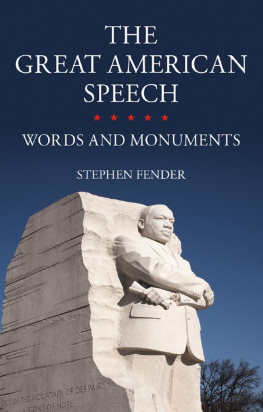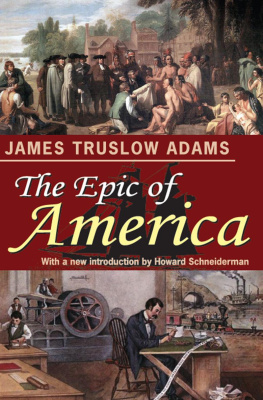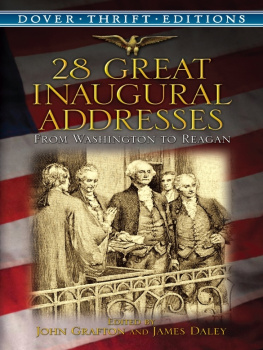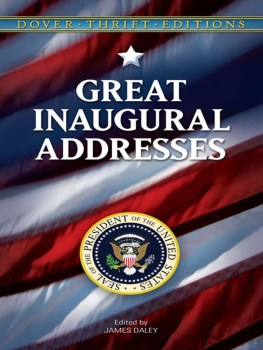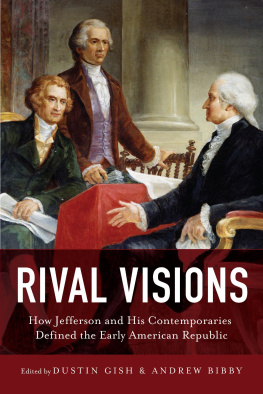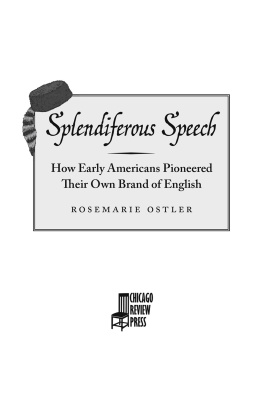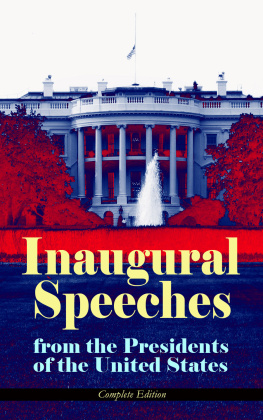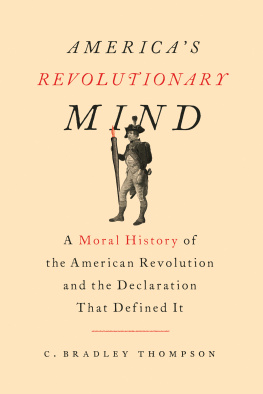Published by Reaktion Books Ltd
33 Great Sutton Street
London EC1V 0DX, UK
www.reaktionbooks.co.uk
First published 2015
Copyright Stephen Fender 2015
All rights reserved
No part of this publication may be reproduced, stored in a retrieval system, or transmitted, in any form or by any means, electronic, mechanical, photocopying, recording or otherwise, without the prior permission of the publishers
Page references in the
Index match the printed edition of this book.
Printed and bound in Great Britain
by TJ International, Padstow, Cornwall
A catalogue record for this book is available from the British Library
eISBN: 9781780235486
PART ONE
A Common Culture
O n 14 February 2008, as the contest to become the Democratic Partys presidential nominee heated up into the desperate struggle for delegates from Texas and Ohio, Hillary Clinton sent a special valentine to her opponent. Sensing that Barack Obamas gift for speechmaking was leaving her policy wonkery far behind, she warned workers at the General Motors plant in Lordstown, Ohio, that Speeches dont put food on the table. Speeches dont fill up your tank, or fill your prescription, or do anything about that stack of bills that keeps you up at night. She continued: Some people may think words are change. You and I know better. Words are cheap.
Obamas answer came swift and certain:
Dont tell me words dont matter! I have a dream. Just words. We hold these truths to be self-evident, that all men are created equal. Just words. We have nothing to fear but fear itself. Just words? Just speeches?
Speeches dont solve all problems, he admitted, but what is also true is that if we cannot inspire the country to
Though effective as a quick-fire put-down, this riposte also reached well beyond the local political contest. Obama was alluding to words that really did change American history, Great American Speeches uttered by men like Franklin Delano Roosevelt, John Fitzgerald Kennedy and Martin Luther King Jr, a rhetorical tradition of public speaking and writing that runs back through the Declaration of Independence to the first days of settlement in the New World.
More to the point, Obamas allusions to this long tradition were picked up and understood by a mass audience. This is highly significant, because it challenges the recurrent lament of American writers and intellectuals, from Nathaniel Hawthorne, Henry James and T. S. Eliot down to the educational theorist E. D. Hirsch, that Americans lack the historical awareness to place the flux of everyday events into the context of a shared culture.
And while its true that only a minority of Americans would recognize a quote from Shakespeare or Wordsworth, or even Herman Melville, Mark Twain or Philip Roth, the highly diverse population really does share a culture not in great literature, or in cathedrals, country houses and traditional social practices, but in public speeches about the values that bind the country together. The Great American Speech is the national culture.
The Kings Speech
Speeches work differently in British culture, where they are seldom delivered to large crowds in the open air. At times the means of their delivery have taken up as much attention as their content. It never occurred to George V to address the empire until the BBC suggested it. As the likelihood grew that his second son would succeed him, so did the panic about Berties stammer. The popular and much awarded film The Kings Speech (dir. Tom Hooper, 2010) is about how he overcame this handicap to grow into his public role as George VI.
The medium is so important because, though British history can claim a share of great election addresses to large crowds, most of the countrys best remembered speeches have occurred indoors, in places to which few, if any, members of the public were allowed access: Lord Mayors banquets, party conferences above all, parliament.
In the nineteenth century the momentous words were conveyed to the public through verbatim newspaper reports, often with helpful guides to the audiences response: (applause), (hearty laughter). Most of Churchills great wartime speeches were first delivered in the House of Commons; the people got to know them only through the newspapers or when he re-read them on the BBC. More recently television has relayed the big set speeches given at party gatherings, like Margaret Thatchers You turn if you want to. The ladys not for turning (Brighton, 1980) and Neil Kinnocks attack on Derek Hatton and his Liverpool councillors of the Militant Tendency, the grotesque chaos of a Labour council a Labour council hiring taxis to scuttle round a city handing out redundancy notices to its own workers (Bournemouth, 1985).
Memory and Rhetoric
Sound bites like these are how the British remember speeches not always fondly. Others include Harold Wilsons white heat of the technological revolution (Scarborough, 1963) and Enoch Powells the Tiber foaming with much blood (West Midlands Area Conservative Political Centre, 1968). But how many can now remember the rest of these speeches, or even their contexts? For that matter who can recall the particular policy on which Mrs Thatcher was refusing to make a U-turn?
In Britain England in particular rhetoric and stage-managing are considered suspect. Kinnock was called a Welsh windbag. Great attention has been paid to how Margaret Thatcher trained her voice to sound at a lower register to give it more authority. Even Churchill came in for criticism from his contemporaries. After the Conservative Party elected him party leader in 1940, one Tory MP commented that he was a word-spinner, a second-rate rhetorician. His most famous speech, the one on 19 June 1940 that ended People will say, This was their finest hour, was thought to be an indifferent performance in the House of Commons, and when he repeated it that night on the BBC, Cecil King, owner of the Daily Mirror, thought he must be either ill or drunk.
Reviewing a recent book on Churchills speeches (Richard Toyes The Roar of the Lion),
Americans, on the other hand, accept the rhetoric of public speaking as part of the form. And they often remember great speeches as a whole rather than in sound bites, because they have had to memorize them at school as a patriotic lesson in American national identity.
Topics
In their long history of parliamentary debate the British have encompassed a wide variety of topics. Some of their best remembered speeches have focused on constitutional issues: Charles I on trial for treason in 1649, claiming that a king cannot be tried by any superior jurisdiction on earth; Prime Minister Benjamin Disraeli (1872) on the role of the monarch and the House of Lords; Labour Party leader Michael Foot opposing piecemeal reform of the House of Lords in 1969. Others have argued for reform, from John Wilkes pleading for a wider franchise to include the new industrial towns in 1776 and William Wilberforce proposing the abolition of the slave trade in 1789, to Prime Minister Harold Macmillan in Cape Town recognizing that a wind of change is blowing through this continent. Vows to defend the realm, too, have stirred the emotions, from Elizabeth Is at Tilbury in 1588 to confront the Spanish Armada with the heart and Stomach of a King, to Churchills that we shall fight them on the beaches, we shall fight them on the landing grounds, we shall fight in the fields and in the streets, we shall fight in the hills, we shall never surrender.

